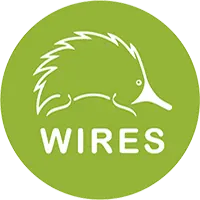Supplementary Food
WIRES Food for Wildlife:
Approved Wildlife Food List
Small Mammals
- Brushtail Possums - small amounts of sweet potato, corn and carrot
- Mountain Brushtail Possums – small amounts of sweet potato
- Echidnas – eggs, lean mince*
- Tasmanian Devils – meat* such as beef heart, raw beef bones, raw chicken carcasses and most fish**
- Quolls – eggs and meat* such as raw chicken carcasses
- Phascogales – eggs and lean meat*
- Bandicoots – lean beef mince
- Tree kangaroo – small amounts of sweet potato
Bats
- Flying-foxes – pears, apples, grapes, stone fruit, paw paw and melons (avoid watermelon), full-fat flavoured yoghurt and goats or cows milk
- Microbats – goats milk
Reptiles
- Blue-tongues, Shinglebacks, Cunningham skinks, Pink-tongued Skinks, Land Mullets - apples, pears, grapes, melons, mango, peas, carrots, pumpkin and leafy green vegetables
- Monitor lizards – raw chicken carcasses
- Sea turtles – fish**, squid and broccoli
- Fresh-water turtles – long-necked turtles can be offered whole fish** such as whitebait and shellfish such as uncooked prawns. Short-necked turtles can be offered the same as fresh-water turtles but also spinach, parsley, dark leafed lettuces, cabbage, broccoli, pumpkin, tomato, apples, pears and stone fruits.
Birds
- Omnivores such as Magpies, Currawong and Ravens – meat* such as beef heart, lean beef, corn, alfalfa sprouts, bean sprouts, corn on the cob and peas
- Carnivores such as Butcherbirds, Kookaburras, Kingfishers - meat* such as beef heart, lean beef
- Insectivores/Granivores such as Plovers – eggs and meat* such as beef heart, lean beef
- Insectivores/Granivores such as Moorhens, Swamp Hens, Coots and Rails - meat* such as beef heart, lean beef
- Nectarivores such as Lorikeets - small amounts of mandarin
- Frugivores such as Figbirds, Bowerbirds, Orioles and Fruit Pigeons - corn on the cob, peas corn and carrot
- Frugivores such as Cuckoos – meat* such as beef heart, lean beef
- Granivores such as Cockatoos – corn on the cob
- Granivores such as King Parrots and Rosellas – corn on the cob
- Granivores such as Quails – green leaf vegetables
- Herbivores such as Geese and Swans – peas, beans, corn and green leafy vegetables (avoid cabbage family)
- Herbivores such as Ducks and Purple Swamphens – green leafy vegetables (avoid cabbage family)
- Piscivores such as Shorebirds (Terns, Pelicans and Seagulls) and true seabirds (Albatross, Shearwaters, Petrels and Cormorants) - fish** such as whitebait, pilchards, red-spot whiting, sardines, squid and mullet
- Piscivores/Insectivores such as Ibis, Herons, Darters and Egrets - meat* such as beef heart, lean beef and small fish**
- Piscivores such as Penguins – oily fish**
- Raptors - meat* such as beef or lamb heart, raw chicken carcass and fish**
CARER NOTES: Supplementary feeds such as store-brought items may be offered to wildlife in care to provide additional nutrition if the rehabilitation area is not capable of supplying sufficient grazing or browse naturally however, any supplementary feeds should mirror the natural diet of the species as closely as possible. The listed store-brought items may not constitute a full captive diet and carers should seek advice from their groups regarding the appropriate amount of supplementary feed to provide and to what age of animal.
Macropods such as red kangaroos, eastern grey kangaroos and wallaroos are prone to clostridial infection and they also have to develop a gut flora capable of digesting highly indigestible native grasses in often quite arid conditions. Highly digestible carbohydrates encourage the wrong kind of gut flora to develop and if exposed to clostridium the animal will be more prone to succumbing to clostridial infection either in the form of bloat, sudden death or diarrhoea. Therefore fruit and vegetables that are high in simple sugars, such as apples, sweet potatoes and carrots should be avoided for macropods.
Carers should take care to avoid foods high in oxalates and calcium in wombats.
Ringtails should not be fed any store-brought fruit or vegetables due to the detrimental effect on their gastrointestinal health.
Penguins should be given oiler types of fish as soon as possible during their rehabilitation to avoid losing their waterproofing and thermoregulation from oiling their feathers from the uropygial glands.
Carers are recommended to avoid feeding native birds on commercially available fruits as most have a fructose : sucrose ration greater than one which can cause diarrhoea, dehydration, and poor nutrition. Alternatively, a pea/carrot/corn mix for birds can be offered to birds that eat native fruits as this is close to the nutritional value of native fruits.
Lean beef should be low in fat (Heart Smart). Beef mince should be avoided because the fat content is not known.
*Any store-brought meat should have Vetafarm Insectivore Mix added for correct calcium to phosphorus ratio and thiamine.
**Diets consisting of store-brought fish should have Vetafarm Seabird Tablets included to counter thiaminase in fish. Thiamine is Vitamin b12. When fish are frozen or stored, thiaminases (enzymes that break down b12 which are naturally found in many fish species) activate and void fish of thiamine. Vetafarm Seabird Tablets are designed to overcome vitamin deficiencies that may occur, especially in diets consisting of frozen fish.
Any questions or comments regarding this list can be directed to WIRES Training via: [email protected]

